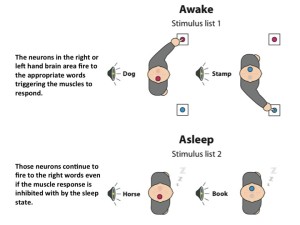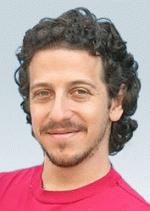Speech processing while unconscious: Sleep inhibits action but not preparation and meaning.
In a team effort between the Medical Research Council Cognition and Brain Sciences Unit (Cambridge, UK) and the Laboratory of Cognitive and Psycholinguistics Sciences, Ecole Normale Superiore (Paris), part of what we are capable of while sleeping has been unravelled.
People were asked to classify words belonging to one of two categories – animals or objects – by pressing buttons with the left or the right hand, and continued to do so until they have fallen asleep. Their brain activity indicated that they were able to decode the meaning of the words and intended to act but the unconscious state during sleep prevented them from responding (no movement of the fingers).
 This result indicates that once a rule (animals press left/objects press right) is established during wakefulness it can still be implemented even during sleep. This means that the decoding networks in the brain process the spoken words and that information (if it is an animal or an object for instance) is passed to a motor plan signaling the intention and subsequent action. During sleep that action is inhibited (we do not purposefully move during sleep) but this study has found that the meaning extraction and subsequent action preparation remained but was slower and lasted longer.
This result indicates that once a rule (animals press left/objects press right) is established during wakefulness it can still be implemented even during sleep. This means that the decoding networks in the brain process the spoken words and that information (if it is an animal or an object for instance) is passed to a motor plan signaling the intention and subsequent action. During sleep that action is inhibited (we do not purposefully move during sleep) but this study has found that the meaning extraction and subsequent action preparation remained but was slower and lasted longer.
To confirm this result a second study tested whether people could classify word or nonwords (like boat or foat). A similar pattern emerged, showing appropriate brain preparation activity for left or right button presses even if responses were inhibited by the sleep mechanisms.
Paper e ntitled “Inducing task-relevant responses to speech in the sleeping brain”, with CBU researcher, Tristan Bekinschtein, right. Published in Current Biology (online 11th of September) – see here .
ntitled “Inducing task-relevant responses to speech in the sleeping brain”, with CBU researcher, Tristan Bekinschtein, right. Published in Current Biology (online 11th of September) – see here .
Sid Kouider1, Thomas Andrillon1-2, Leonardo S. Barbosa1-2, Louise Goupil1-2 & Tristan A. Bekinschtein3,4
1 Laboratoire de Sciences Cognitives et Psycholinguistique, CNRS/EHESS/DEC-ENS, 29 rue d’Ulm, 75005 Paris, France.
2 Ecole Doctorale Cerveau-Cognition-Comportement, Université Pierre et Marie Curie, 9 Quai Saint Bernard, 75005 Paris Paris, France.
3 Cognition and Brain Sciences Unit, Medical Research Council, 15 Chaucer Road, Cambridge, CB2 7EF, England, UK.
4 Department of Psychology, University of Cambridge, Downing Street, Cambridge, CB2 3EB England, UK.

 MRC Cognition and Brain Sciences Unit
MRC Cognition and Brain Sciences Unit


